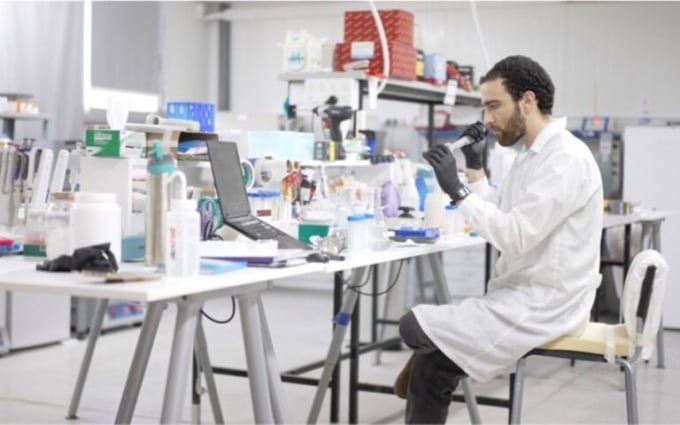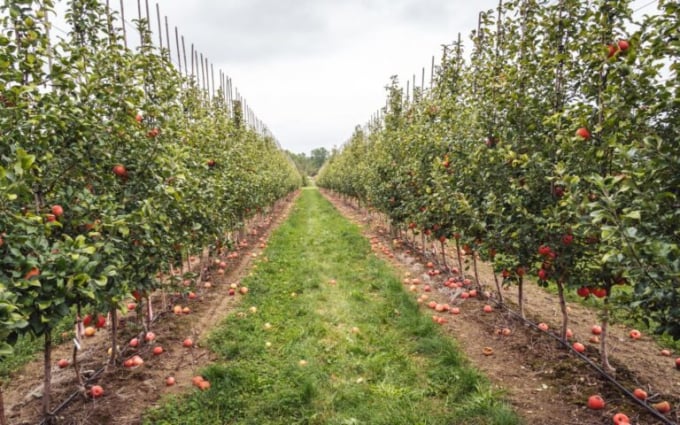May 25, 2025 | 11:32 GMT +7
May 25, 2025 | 11:32 GMT +7
Hotline: 0913.378.918
May 25, 2025 | 11:32 GMT +7
Hotline: 0913.378.918

The BetterSeeds lab in the moshav of Givat Chen in central Israel. Photo: BetterSeeds
One of the main challenges facing the world of agriculture is that it is simply not profitable enough. Fields are dying in the developed world. Farmers across the globe are struggling to grow and sell crops. Food shortages are a real threat.
A big reason for these troubles is the fact that many crops must be harvested by hand, which is labor-intensive and costly.
Israeli startup BetterSeeds plans to genetically change the architecture of many types of crops to enable mechanized picking.
If that sounds a bit too scientific, BetterSeeds CEO and founder Ido Margalit points to one common, successful example – ketchup.
“Without one genetic trait that was discovered in tomatoes a few decades ago we wouldn’t have had ketchup or tomato concentrate industries. Because how is it that you pay so little money for ketchup that is made from so many kilograms of tomatoes?”
The answer, Margalit says, lies in the development of industrial tomatoes.
Regular tomatoes grow on vine trellises and can’t be harvested by machine. The discovery of a certain genetic trait enabled tomatoes to grow in bush form in regular fields, easily harvested by machine. This lowered costs so that we can get ketchup for a reasonable price.
“Pickle companies have been desperately looking for a similar trait that will turn cucumbers, like tomatoes, into something that can be grown on the ground in the field,” Margalit notes. “We found the gene that can be edited using CRISPR to enable growing it in the field.”
CRISPR-Cas9 gene editing technology earned its developers the 2020 Nobel Prize in Chemistry. BetterSeeds is licensing the technology from Corteva Agriscience and the Broad Institute of MIT and Harvard.
“It’s the most important scientific breakthrough that will likely change the world of medicine and agriculture in the next few years and also much further down the line,” Margalit says.
“Eight years ago, we recognized that agriculture will focus on plant improvement based on this technology. We said that we’d improve commodity crops using CRISPR.”
At the time, food-tech wasn’t a focal point for investors like it is today, he adds. “So we looked at the world of cannabis, which had many problems that we could solve using CRISPR.”
BetterSeeds’ previous incarnation, CanBreed, used CRISPR gene-editing technology to provide stable, consistent hybrid hemp seeds for standardized medical-grade cannabis. Margalit heads the Forum of Medical Cannabis Seeds in Israel’s Chambers of Commerce Association, which just succeeded in getting the government to approve cannabis seeds export from Israel.
With the rebranding to BetterSeeds, Margalit and his partners have turned their attention to commodity crops, particularly cowpeas(black-eyed peas), soybeans and other legumes.
Brushing aside negative public perception of GMO foodstuffs, Margalit explains that CRISPR doesn’t insert foreign genes but instead utilizes what already exists in the plant.

Using BetterSeeds technology, apple orchards could become a seasonal affair. Photo: Unsplash
“Gene editing can be likened to molecular scissors running along the plant’s DNA and cutting out parts in predetermined spots to receive the positive traits that you’re interested in. It’s easy-to-use, precise technology.”
Because no foreign genes are introduced into the plant, there’s substantially less regulatory red tape on the matter.
“All of our R&D is being carried out by an Israeli team at our facility in Givat Chen,” he says, referring to a farming community in central Israel. “Our solutions are global. Our products are suitable for the whole world – not only for developed countries but also developing countries.”
BetterSeeds’ improved cannabis strains will probably go to market in Israel by the end of the year, says Margalit.
“By the end of 2022, we’ll have substantial income from sales across the world. We’ll begin marketing our non-cannabis products at the end of 2023,” he predicts.
Looking further ahead, Margalit would like to branch out into perennial crops — that is, crops that aren’t planted annually but for the long term, such as apple and citrus trees.
Gene-editing technology could make perennials less lengthy and risky investments.
“Nowadays, a farmer plants his crops and waits a good few years, during which he makes zero income from the orchard. In the meantime, he’s hoping the crops won’t catch some disease or that climate change won’t ruin everything, or that consumers’ preferences and tastes won’t change,” he notes.
“It’s a problem with perennial crops — you’re taking a risk whether you’ve invested at the right time. It also costs a lot of money to uproot an orchard, and many farming families are simply stuck with certain crops.”
Gene editing would make the perennial crop seasonal, says Margalit.
“We’re focusing on a number of genes that not only change the architecture of the plant but also its maturity rate. Instead of reaching maturity after six years, it will reach maturity after a year and a half, and instead of trees they’ll be low saplings that can be mechanically harvested.”
This change would increase the farmers’ versatility and how they can utilize their land each year. It could make farming more profitable and increase the range of crops.
“It’s a very significant vision,” Margalit says.“I think that we’ll be able to change the first strains from perennial to seasonal in 2025 or 2026. For each crop, we’d need to adapt and adjust the CRISPR, and that’s one of the challenges.”
If Margalit had to choose one crop to focus on,it may be the cowpea. This bean grown for human and animal consumption tolerates the sandy soil and low rainfall typical to semiarid regions across Africa and Asia.
“If I need to focus on the crop that’s suffering from the biggest gaps, the largest need in the market and which would help feed the world – it’s the cowpea. Even if we succeed only in that, we’d have made enormous change.”
(Israel21c)

(VAN) Alt Carbon has raised $12 million in a seed round as it plans to scale its carbon dioxide removal work in the South Asian nation.

(VAN) Attempts to bring down the price of the Japanese staple have had little effect amid a cost-of-living crisis.

(VAN) Fourth most important food crop in peril as Latin America and Caribbean suffer from slow-onset climate disaster.

(VAN) Shifting market dynamics and the noise around new legislation has propelled Trouw Nutrition’s research around early life nutrition in poultry. Today, it continues to be a key area of research.

(VAN) India is concerned about its food security and the livelihoods of its farmers if more US food imports are allowed.

(VAN) FAO's Director-General emphasises the need to work together to transform agrifood systems.

(VAN) Europe is facing its worst outbreak of foot-and-mouth since the start of the century.